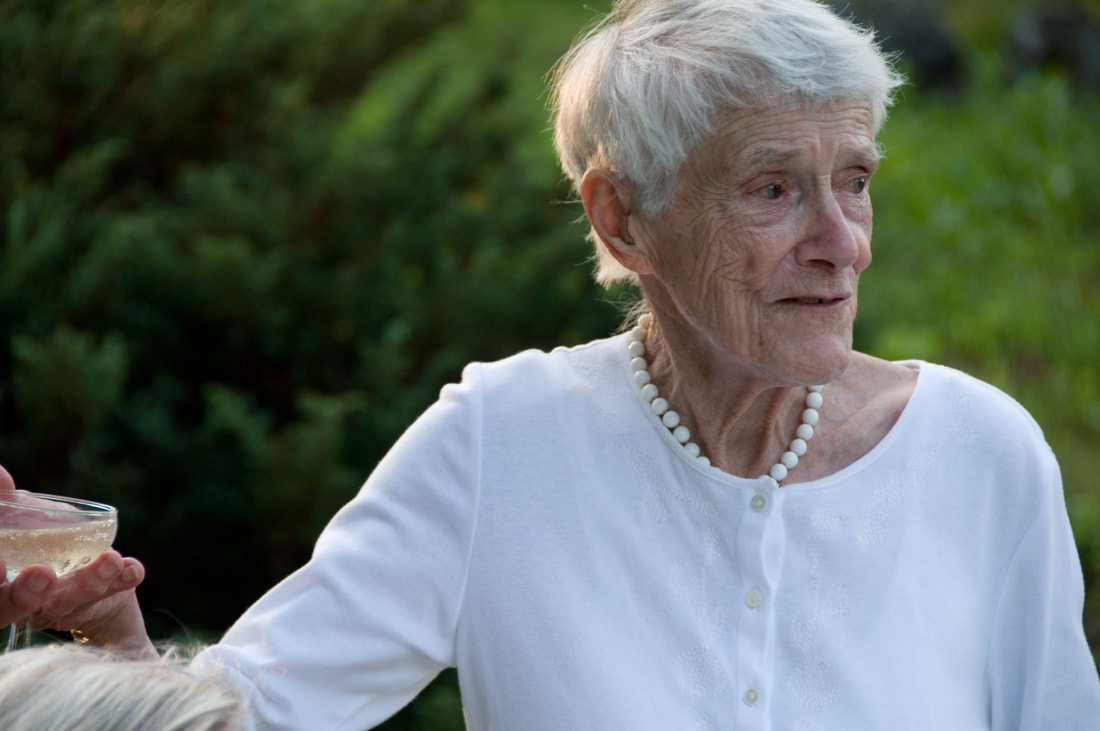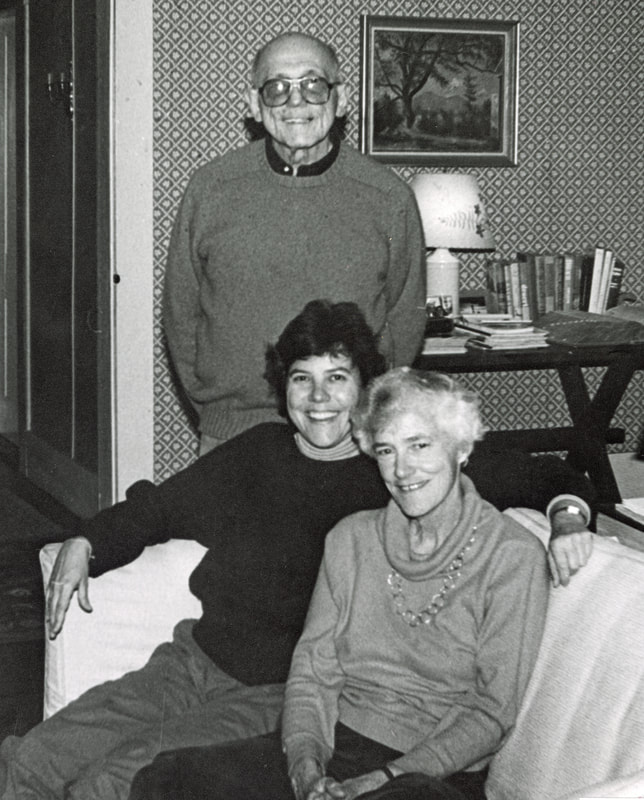"OUR WOMEN OF SANDWICH"
(2020 Summer Exhibit)
JOCELYN GUTCHESS
1921-2014
I first met Jocelyn Gutchess in 1989 when I went with my future wife, Susan, to meet her parents at their summer home in Sandwich. A child of the south, I was amazed by the forests, the cool clear days and starry nights of this beautiful hamlet.
Jocelyn and Frank Gutchess moved to Sandwich full-time in 1990. In time I became part of the family, and Jocelyn welcomed me into her storied past and active present with tales of her childhood as an Army brat living in West Point where her father Philip Fleming was chair of Athletics. Next came East Point, Maine when his engineering background led to his appointment to head up the Passamaquoddy project to harness the tides in the Bay of Fundy to produce hydroelectric power. Though the project's budget was cut as funding priorities shifted to World War II, it revealed Philip's enormous drive and talent, and exposed his young daughter to the Roosevelt children, with whom she played hide-and-seek in Sarah Delano Roosevelt's home at Campobello. The local school was behind grade level and Jocelyn was sent to boarding school at Concord Academy, embarking on an active and communal lifestyle she would pursue all her life. Bryn Mawr College was a continuation of this love of learning and pursuit of excellence. Meanwhile her father continued his illustrious career as head of Roosevelt's Public Works Administration and as Ambassador to Costa Rica. Her mother, Dorothy Fleming Clay, a long-time Sandwich summer person, was a charming and athletic woman. As Philip's career wound down, they settled in Sandwich and Washington. Jocelyn returned to DC after the war, married Frank Gutchess, and began work as an economist first in government, then as a private consultant.
Retirement would not be an accurate word to describe her life in Sandwich. She dove into environmental work in the locality and region, contributing hours of time and significant treasure to the work of the Squam Lakes Conservation Society and the Lakes Region Conservation Trust. Jocelyn adored sports and enjoyed teaching tennis and skiing to elementary schoolers in town. She fostered efforts to maintain the General Store and spearheaded a committee of the five towns bearing on Squam to maintain the Lake's integrity and environmental health. With several others she developed a theme-based winter lecture series called Winterset, inviting university professors and statewide experts to teach the classes. Her drive and commitment made her a solid asset to her many community efforts.
But perhaps most important to Jocelyn was her calling to early leadership in the Over the Hill Gang. She hiked and climbed with the group bi-weekly from age 70 until her early 90’s, completing all of the 4000 footers, not once but 4 times. She really preferred a view to simple peak-bagging, though, and she had an unusual talent, akin to a photographic memory, for remembering the twists and turns of every trail. Years later she could prepare an aspiring hiker by recounting exactly what they would find at every turn. Perhaps her greatest dismay at aging was her inability to beat book time! I remember her fastidious preparations when leading a hike to carry extra water, a well-stocked first aid kit and complete knowledge of the trail. Robin Dustin lately recounted how once Jocelyn stayed with her at the rear of the pack, and when she doubted she could make an icy pitch, Jocelyn said, "You're doing fine...KEEP GOING!" That helpful attitude was emblematic of her positive engagement with her beloved Sandwich.
Helen Ingalls
May 2020
Jocelyn and Frank Gutchess moved to Sandwich full-time in 1990. In time I became part of the family, and Jocelyn welcomed me into her storied past and active present with tales of her childhood as an Army brat living in West Point where her father Philip Fleming was chair of Athletics. Next came East Point, Maine when his engineering background led to his appointment to head up the Passamaquoddy project to harness the tides in the Bay of Fundy to produce hydroelectric power. Though the project's budget was cut as funding priorities shifted to World War II, it revealed Philip's enormous drive and talent, and exposed his young daughter to the Roosevelt children, with whom she played hide-and-seek in Sarah Delano Roosevelt's home at Campobello. The local school was behind grade level and Jocelyn was sent to boarding school at Concord Academy, embarking on an active and communal lifestyle she would pursue all her life. Bryn Mawr College was a continuation of this love of learning and pursuit of excellence. Meanwhile her father continued his illustrious career as head of Roosevelt's Public Works Administration and as Ambassador to Costa Rica. Her mother, Dorothy Fleming Clay, a long-time Sandwich summer person, was a charming and athletic woman. As Philip's career wound down, they settled in Sandwich and Washington. Jocelyn returned to DC after the war, married Frank Gutchess, and began work as an economist first in government, then as a private consultant.
Retirement would not be an accurate word to describe her life in Sandwich. She dove into environmental work in the locality and region, contributing hours of time and significant treasure to the work of the Squam Lakes Conservation Society and the Lakes Region Conservation Trust. Jocelyn adored sports and enjoyed teaching tennis and skiing to elementary schoolers in town. She fostered efforts to maintain the General Store and spearheaded a committee of the five towns bearing on Squam to maintain the Lake's integrity and environmental health. With several others she developed a theme-based winter lecture series called Winterset, inviting university professors and statewide experts to teach the classes. Her drive and commitment made her a solid asset to her many community efforts.
But perhaps most important to Jocelyn was her calling to early leadership in the Over the Hill Gang. She hiked and climbed with the group bi-weekly from age 70 until her early 90’s, completing all of the 4000 footers, not once but 4 times. She really preferred a view to simple peak-bagging, though, and she had an unusual talent, akin to a photographic memory, for remembering the twists and turns of every trail. Years later she could prepare an aspiring hiker by recounting exactly what they would find at every turn. Perhaps her greatest dismay at aging was her inability to beat book time! I remember her fastidious preparations when leading a hike to carry extra water, a well-stocked first aid kit and complete knowledge of the trail. Robin Dustin lately recounted how once Jocelyn stayed with her at the rear of the pack, and when she doubted she could make an icy pitch, Jocelyn said, "You're doing fine...KEEP GOING!" That helpful attitude was emblematic of her positive engagement with her beloved Sandwich.
Helen Ingalls
May 2020


